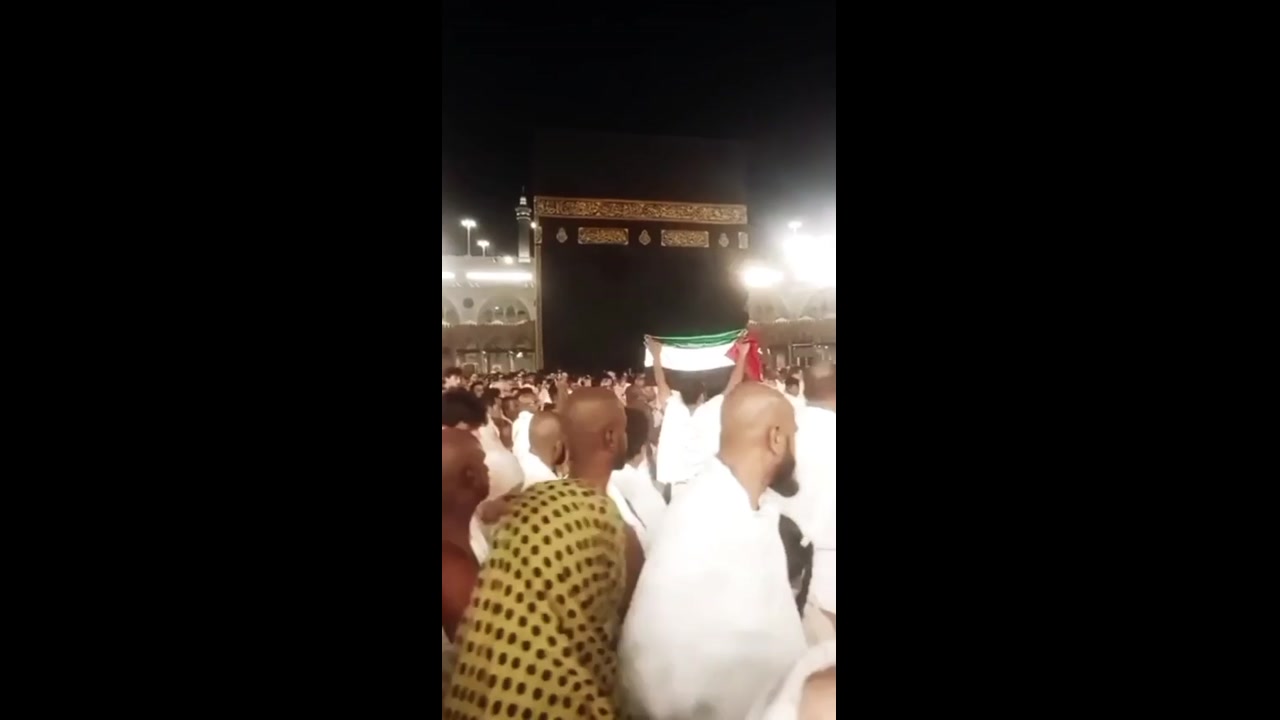![[Video] Gunfire between Iraqi security forces and Sadr militias in Baghdad](/api/image/thumbnails/thumbnail-1768343508874-4redb-thumbnail.jpg) 0:20
0:20Saudi Security Detains Egyptian Pilgrim for Raising Palestinian Flag During Hajj

About This Video
Saudi authorities detained an Egyptian pilgrim for raising a Palestinian flag during Hajj, igniting debates on political expression in a sacred setting. This incident raises critical questions about the limits of free speech in the Kingdom.
Saudi Security Detains Egyptian Pilgrim for Raising Palestinian Flag During Hajj
In a significant incident at the Masjid Al-Haram in Mecca, Saudi security forces detained an Egyptian pilgrim who raised the Palestinian flag during the Hajj pilgrimage. This act, interpreted by authorities as a political demonstration, has sparked discussions about the intersection of religion and political expression in the Kingdom, especially during one of the most sacred times for Muslims around the world.
The Hajj, which draws millions of Muslims annually to the holy city of Mecca, is not only a religious pilgrimage but also a profound display of unity among Muslims. However, the Saudi government maintains strict regulations against political demonstrations, emphasizing that the pilgrimage should be solely a spiritual experience. This recent event has raised eyebrows, drawing attention to the complexities surrounding political expressions in a region fraught with tension and conflict. The act of raising the Palestinian flag, a potent symbol of solidarity in the Arab world, was seen as a violation of these regulations, leading to the pilgrim's immediate detention.
According to eyewitness accounts, the Egyptian pilgrim raised the flag during one of the rituals of Hajj, which was met with swift action from security personnel. The Saudi authorities have not released the pilgrim’s identity or any further details regarding his arrest, leaving many to speculate about the implications of such actions during a religious event. This incident mirrors earlier coverage of political expressions within religious contexts, such as Geert Wilders' condemnation of Macron's Palestinian state recognition, where political statements in sensitive environments have resulted in significant backlash and consequences.
The broader implications of this incident extend beyond the immediate arrest. Experts suggest that the Saudi government's reaction underscores its commitment to maintaining a politically neutral environment during religious rites, particularly as tensions regarding the Palestinian issue continue to escalate in the Middle East. Recent developments in the region, including Iran's efforts to unite various factions for change, reflect a complex landscape where political realities often intrude upon religious observances. The situation beckons a historical comparison to previous instances where political dissent was met with force, further complicating the narrative surrounding freedom of expression in the region.
The consequences of this incident are multi-faceted. For the detained pilgrim, the immediate future remains uncertain, as the Saudi authorities have not disclosed any plans for legal proceedings or potential release. For the broader Muslim community, this event may serve as a stark reminder of the delicate balance between religious observance and political expression in a region where both are intricately linked. As previously reported, similar situations have led to heightened tensions and calls for reform within the Kingdom, particularly from those advocating for greater freedoms and rights.
Looking ahead, this incident may catalyze a renewed conversation about the role of political expression within religious contexts, particularly in a time when global attention is increasingly focused on issues of justice and human rights. As the world watches, the implications for both the Saudi government and the international community could be profound. The situation serves as a poignant reminder of the complex dynamics at play in the region, where the sacred and the political often intersect in unexpected ways. The future of such expressions during the Hajj may depend on the Kingdom's ability to navigate these sensitive waters while maintaining its religious integrity.
More Videos
![[Video] Gunfire between Iraqi security forces and Sadr militias in Baghdad](/api/image/thumbnails/thumbnail-1768343508874-4redb-thumbnail.jpg) 0:20
0:20![[Video] Greenland Prime Minister states preference to remain with Denmark](/api/image/thumbnails/thumbnail-1768343466645-jiogu-thumbnail.jpg) 0:21
0:21[Video] Greenland Prime Minister states preference to remain with Denmark
![[Video] Heavy clashes and gunfire reported in Baghdad, Iraq](/api/image/thumbnails/thumbnail-1768342239932-848qsh-thumbnail.jpg) 0:07
0:07[Video] Heavy clashes and gunfire reported in Baghdad, Iraq
![[Video] Mexican President Sheinbaum: US intervention cost us half our territory](/api/image/thumbnails/thumbnail-1768341060521-7mbwia-thumbnail.jpg) 0:48
0:48[Video] Mexican President Sheinbaum: US intervention cost us half our territory
![[Video] Federal officers deploy sting balls and flash grenades at Whipple Building](/api/image/thumbnails/thumbnail-1768340555229-vhfcc-thumbnail.jpg) 1:06
1:06[Video] Federal officers deploy sting balls and flash grenades at Whipple Building
![[Video] Trump gestures and curses at Ford worker who called him 'pedophile protector'](/api/image/thumbnails/thumbnail-1768340459496-0wsk2e-thumbnail.jpg) 0:12
0:12